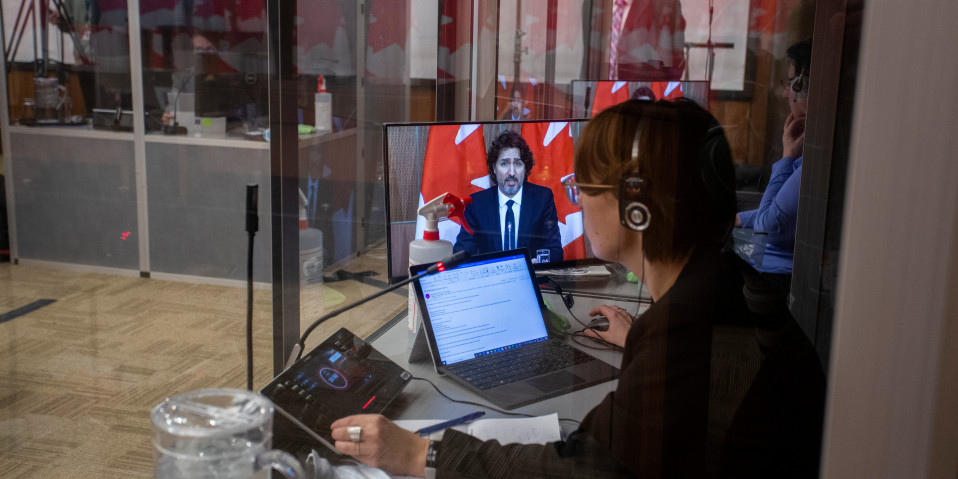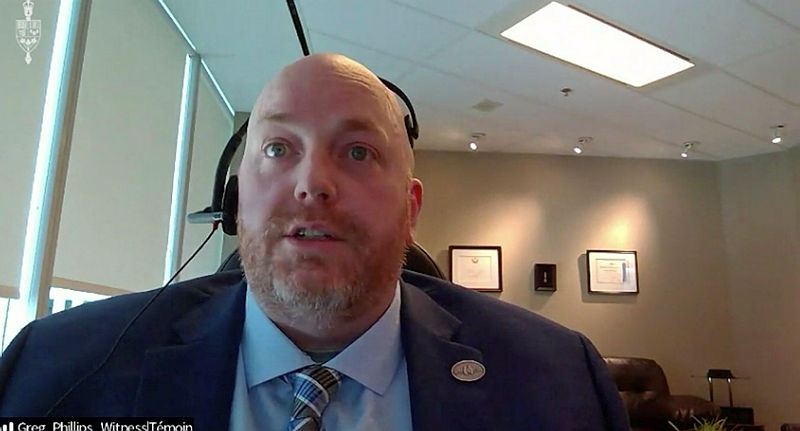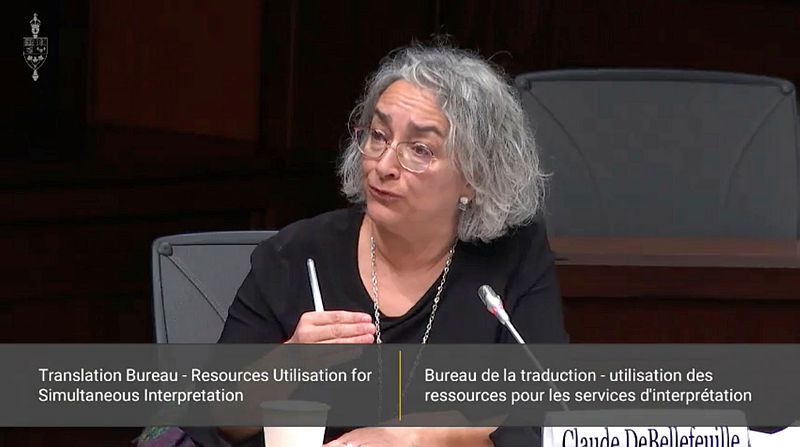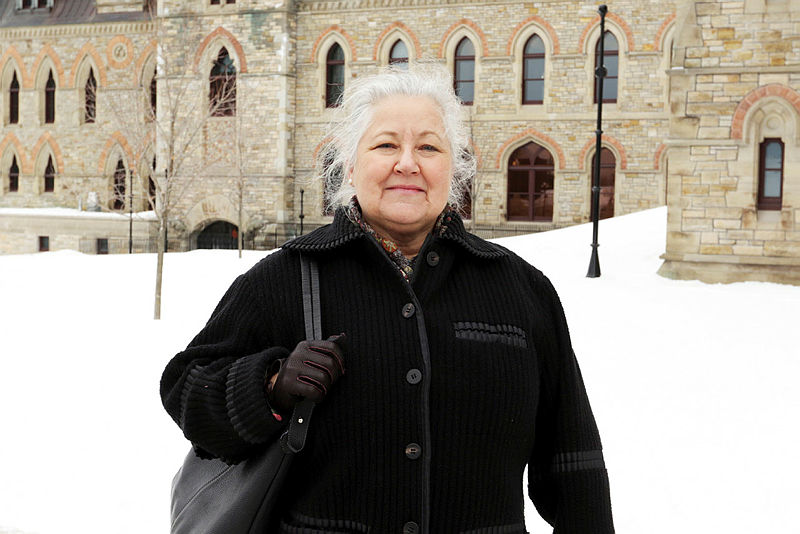Alarms still ringing: interpreters continue to face challenges in hybrid Parliament, putting limited workforce at risk

With a workforce in short supply, interpreters supporting Parliament continue to face challenges amid virtual proceedings, and unless more is done to address identified issues and prevent a further dwindling of available interpreters, it could lead to a “critical problem” for Canada’s bilingual Parliament, says Canadian Association of Professional Employees national president Greg Phillips.
“They’re filing incident reports daily,” said Phillips, whose union represents the 65 official language interpreters on staff with the federal Translation Bureau, many of whom, he said, “are considering leaving their job early or seeking other employment because of this.” Problems encountered in covering hybrid meetings have been “unrelenting and merciless” for the past two years, he said.
“You’re not looking at an available workforce that’s very high,” said Phillips. “What will Parliament do when interpretation is not available anymore and they cannot understand someone who’s trying to relay a critical message? Because not all Parliamentarians are bilingual.”
On Feb. 2, CAPE filed a complaint against the Translation Bureau with Employment and Social Development Canada’s labour program, alleging it has “failed to provide CAPE members with a safe work environment,” and violated its obligation to ensure the health and safety of its employees by not taking the “appropriate steps” to protect interpreters from the “harms and injuries caused by poor sound quality during remote interpretation” since Parliament moved online two years ago. Instead, Phillips said, the Translation Bureau and the House of Commons have been passing the buck.

CAPE’s Greg Phillips, pictured during a May 4, 2020, Procedure and House Affairs Committee meeting. Screenshot courtesy of ParlVu
“We hope that … with the filing of this complaint we can finally ensure that our members’ health and safety is being protected,” said Philips, noting his association doesn’t often file such complaints, “so when we do, it means it’s really quite serious.”
CAPE first raised the alarm over the issues and injuries being experienced by interpreters during remote proceedings in May 2020, noting reports of headaches, nausea, and tinnitus as a result of acoustic shocks and toxic sound. A January 2021 survey by the International Association of Conference Interpreters (AIIC), whose members include interpreters working for the Translation Bureau (including freelancers), found 70 per cent of staff interpreters reported suffering injuries from remote interpretation work. And a May 2021 survey by CAPE found 92 per cent of respondents were concerned about future job-related hearing loss.
The House of Commons and Senate have instituted a number of “precautions” on the advice of the bureau, including asking remote meeting participants to use hard-wired internet connections, integrated microphone headsets (which have and are being provided to both Parliamentarians and witnesses), and to turn cameras on; having a sound technician work alongside interpreters at all times; conducting pre-meeting sound checks; and urging participants to provide written statements to interpreters in advance when possible. All interpretation consoles on the Hill have also been replaced with International Organization for Standardization (ISO)-compliant models with built-in sound limiters.
As well, the bureau—which provides the staff, while the House administration is responsible for providing equipment—has reduced shift hours for interpreters, increased the number of people assigned to each shift to allow for more breaks, and instructed interpreters to interrupt service if working conditions jeopardize their health. It’s also pursued a number of studies, including by the National Research Council (NRC).
But problems persist.
So far this year, staff interpreters have filed 25 hazardous occurrence investigation reports (16 of which relate to service to Parliament), according to numbers provided by the bureau to The Hill Times on Feb. 25. That follows 99 such reports filed in 2021 (73 related to Parliament), and 125 in 2020 (110 at Parliament).
At a House Board of Internal Economy (BOIE) meeting on Feb. 17, Bloc Québécois Whip Claude DeBellefeuille (Salaberry-Suroît, Que.) raised concern over continued issues with interpretation, citing findings from her office’s work to monitor all House committee meetings since January.

Bloc Whip Claude DeBellefeuille, pictured during the BOIE’s Feb. 17 meeting. Screenshot courtesy of ParlVu
“The problems are still with us, we do not have 100 per cent performance rate, we are still experiencing difficulties,” said DeBellefeuille of her findings. “We’ve been surprised since the resumption in January at how many problems there’ve been. We’ve seen it, we’ve felt it, and in several committees. The kinds of problems that are currently being experienced lie in the fact that several Members are still not using the House-provided equipment.”
DeBellefeuille said she’s logged names, dates, and committees where MPs have used improper equipment or interpreters have otherwise struggled with sound interference, affecting MPs’ work. She noted an example from earlier that day, where an MP at the Public Safety Committee tuned in using an “iPhone headset” (AirPods) rather than the microphone headset distributed by the House. Without naming names, she said some committee chairs “do not respect routine motions” to confirm sound checks have been done before meetings start. She also noted two instances of witnesses being allowed to testify remotely with cameras switched off, and raised cases of committee chairs allowing meetings to continue, despite objections, including one instance when an interpretation channel wasn’t working, which prevented a Bloc MP “from actively participating because this person couldn’t be heard or understood.”
“The battle for which I’m leading the charge here at the Board of Internal Economy is to optimize participation of Members who either speak French or English so they can access the appropriate services, but also to remind the clerks to support their chairs who don’t respect the routine motions and who don’t seem to really be aware in order to ensure participation of francophone Members,” said DeBellefeuille, who asked her fellow caucus whips to remind MPs and committee chairs of the rules adopted to protect interpreters.
In response, NDP, Liberal, and Conservative BOIE members spoke of the importance of protecting interpreters, and agreed with DeBellefeuille’s suggestion. (While he committed to revisit the issue with his caucus, Conservative Whip Blaine Calkins added that he sees a simple solution to issues encountered: ending the hybrid Parliament. To note: Phillips and others have said that, post-pandemic, they expect virtual participation in committee meetings—which has long been possible for witnesses—to continue at a higher rate than pre-pandemic.)
However, Nicole Gagnon, advocacy lead for the AIIC, said continued problems with sound quality go beyond the use of improper equipment or poor internet connections (if speakers tune in via WiFi on mobile devices instead of on a computer using a direct ethernet connection, as some MPs continue to do), to the House of Commons’ own audio-visual system—a problem she said the NRC’s most recent findings point to.
The NRC’s reports for the bureau are not publicly available, but The Hill Times obtained a copy of a (highly technical) slide presentation prepared by NRC researchers in October 2021 on its report from the month before analyzing the sound quality of the signal “offered to interpreters by the interpretation consoles and the AV [audio-visual] system” in different scenarios, including in a Zoom setting, using different microphones and headsets. Researchers found that “the Zoom platform delivers the full frequency range of the audio signal without any frequency cut-off,” reads the presentation. “Moreover no frequency notches are observed in the audio signal provided by the Zoom platform.”
On both counts, testing “clearly demonstrates that the audio-visual system at the House of Commons is responsible for the audio signal degradation and not the Zoom platform,” reads the presentation. Among recommendations noted is that a “major effort should be oriented toward the improvement of the audio signal quality transmitted to the interpretation booths by the AV system at the House of Commons.”
Gagnon said given the NRC’s findings, it’s a problem only the House administration can fix, but expressed frustration at its response to date.
The new consoles are helping protect interpreters against “acoustic shock,” but problems with “toxic sound” persist, said Gagnon.

Nicole Gagnon says she’s opted to no longer work on Parliament because of continued issues with sound quality. Photograph courtesy of Sam Garcia
“There has been improvement thanks to the headsets, but there’s been no improvement in the system,” she said. “The problem is the interface between the House system and Zoom.”
Asked what the House is doing to address issues in this interface identified by the NRC, on Feb. 28 a spokesperson for the administration stressed that the report did not conclude that the House A/V systems are “toxic.” Rather, Heather Bradley, communications director to the House Speaker, said it concluded that the “sound quality received by in-person participants, including interpreters, in hybrid events is of lesser quality compared to that of participants in completely virtual meetings.”
“There are many factors that contribute to the sound quality received by listeners of hybrid events, beyond the integration of the audio-visual system with the Zoom platform,” said Bradley, including devices used and the internet connection. “The House is actively working to resolve the issue of system integration in collaboration with Zoom. Zoom has provided an updated version of their connector, which should address the challenge of frequency cut-off identified by the NRCC report. This new connector is currently in testing to determine if it meets the needs of interpreters.”
Risk of interpreter shortage
At the BOIE on Feb. 17, DeBellefeuille also flagged issues she’s noticed with technical briefings, including the Justice Department’s recent briefing on the Emergencies Act, at which she said there were no interpreters; instead, an anglophone public servant was left “trying his best to interpret into French.”
“I’ve never seen such a pathetic briefing,” said DeBellefeuille.
On Feb. 21, she wrote to Official Languages Minister Ginette Petitpas Taylor (Moncton-Riverview-Dieppe, N.B.) saying the “level of French in ministerial briefings has deteriorated to the point of unacceptability,” and urging the minister to take “the necessary steps to ensure that francophone MPs are never again subjected to this disrespect.”
In response to DeBellefeuille at the BOIE, Lucie Séguin, CEO of the Translation Bureau, noted she’d “hit upon a key issue here … that’s interpreters’ capacity.”
Séguin noted the bureau is legislated to prioritize service to Parliament—the House and the Senate—but also strives to support requests from all federal departments and agencies, the Supreme Court, the Privy Council, the Prime Minister’s Office, press conferences on the Hill, and more. Over the last two years, its volume of work has increased, she explained, and, despite being the largest employer of interpreters in Canada, it’s been struggling with a limited capacity.
With an average of only three to five master’s program graduates in Canada per year (the bureau typically hires all of them, so long as they meet the bureau’s own quality standards), it’s not keeping pace with attrition. In the last three years, Séguin said nine new interpreters have been hired, but 12 have retired.
According to Phillips, two staff interpreters with his association have quit since the start of the year because of current working conditions. And according to Gagnon, the number of freelancers signing open contracts with the bureau is down 36 per cent since 2019.
Gagnon said she personally made the choice last spring to no longer work as a freelance interpreter on the Hill “in the existing working conditions.” She noted that incident reports filed with the bureau are only the “tip of the iceberg,” as only staff interpreters can file them.
The bureau, in its Feb. 25 emailed response, said only one staff interpreter has left the bureau since March 2020, and that person now works as a freelancer. Along with this, two staff interpreters are currently on medical leave, but “for personal reasons not related to their profession.” However, it did confirm the 36 per cent decrease in open contract freelancers: from 137 in 2019-20, to 88 this fiscal year.
The bureau, which has a number of initiatives aimed at fostering more graduates, noted the interpreter shortage goes beyond Canada and is a global problem.
Initial response to CAPE complaint insufficient: Phillips
Five days after CAPE filed its complaint with ESDC’s labour program, the bureau issued a new directive, indicating that individuals participating in virtual meetings must use a proper headset or desk microphone in order to have their speech interpreted. The bureau said this technical requirement was shared with all departmental and agency clients, which “must confirm in writing that they will respect all of the technical requirements for their events.”
But, as confirmed by DeBellefeuille at the BOIE on Feb. 17, this directive does not apply to interpreters supporting Parliament.
Phillips said the directive “didn’t go far enough.” For one thing, he said it focuses only on microphone equipment, not the issue of poor internet connections, and “we still have reports of people participating in sessions where they connect through their phone or through a tablet.” Moreover, he said, it puts the “onus and stress on the interpreters” to deny service.
Asked about the fact the directive doesn’t address internet connections, the bureau said “technical aspects related to interpretation are the responsibility of event organizers,” but it does share “specific requirements for interpretation services” prior to events.
ESDC confirmed on Feb. 25 that it is currently assessing CAPE’s Feb. 2 complaint to determine whether an investigation is required.
The Board is set to return to subject at its next meeting, expected later this week. On Feb. 28, CAPE requested to appear as a witness.
Editor’s Note: This story was updated on March 2 to correct that it is the Canadian Association of Professional Employees, not the Canadian Association of Parliamentary Employees.
The Hill Times






 LICENSING
LICENSING PODCAST
PODCAST ALERTS
ALERTS













